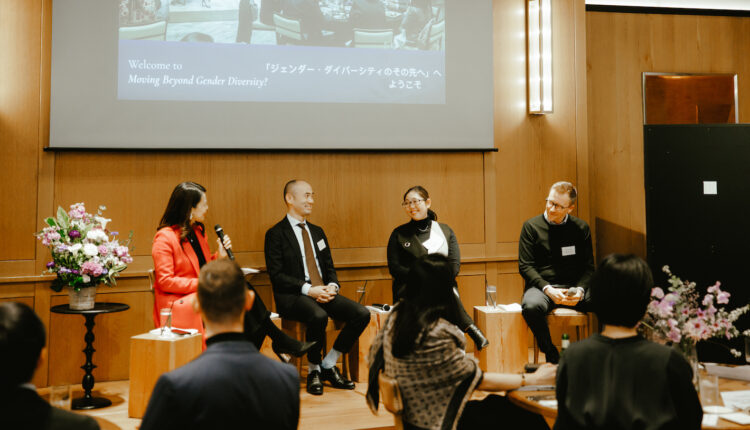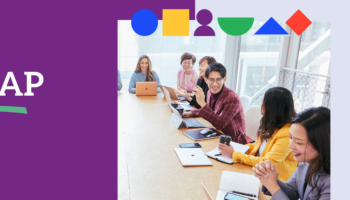On International Women’s Month, themes related to gender diversity, such as gender equity and women’s empowerment, are discussed from various angles. However, should we still be focusing on gender diversity? Or are we ready to move beyond, to other areas of diversity?
We invited a group of executive leaders from Astellas Pharma, Cisco Japan and Philip Morris to unpack these questions and explore the implications in the Japan context. Below are some key insights that were shared during the panel discussion.
Are we ready to move beyond gender diversity?
- Focus on gender diversity and beyond it
Organisations are at different stages of progress when it comes to diversity – some are still focusing on gender and some have moved beyond it. While there is still a lot of work needed in the gender diversity space, it shouldn’t be the only focus.
- Take an intersectional approach
We need to move beyond viewing diversity as binary and shift to a more intersectional approach, which relates to the ways in which different aspects of a person’s identity can expose them to overlapping forms of discrimination and marginalisation.
- The “why”?
It is essential to ask why diversity, equity and inclusion (DEI) benefits your specific company. Linking it to a business imperative is crucial to create lasting change and help others understand the value of it.
How to implement lasting DEI change
- There is a need to move from “shifting mindsets” to “shifting behaviors” when implementing DEI. Once people see the business results, the mindset change will also follow.
- Define what good looks like, and role model what great looks like, but note that great changes all the time, so it needs to be an ongoing process. Failure is part of the process so embrace the willingness to try and learn.
- DEI has to be incorporated into everyday business and the leaders need to show the example by committing to it.
Creating inclusive cultures
- Know what kind of culture you want to build – it’s important to ask your employees about it so you can build it together.
- Take a top-down, bottom-up but also sideways approach to culture, incorporating action plans and accountability to drive progress. What you measure gets done.
- Inclusion involves harnessing the best in people and removing environmental and structural barriers that hinder them from performing at their best in the workplace.
Impactful Messages from Panelists:
Kentaro Shimamoto || Astellas Pharma, Vice President, HRBP Commercial
At the starting point of any reform, the commitment of the leader is important. Leaders need to clearly share with a wide range of stakeholders where they are heading as an organization. Commitment is not just a shout or a declaration of determination, but I think it can be expressed more clearly by making decisions with an understanding of trade-offs based on consistent criteria. In modern business, diversity is essential for accelerating innovation and understanding the market.
Ai Miyakawa || Cisco Japan, Head of People & Communities
Why is Equity & Inclusion useful for your company? At work, the human element is paramount. It’s most important to be a person, to be who you are, to be the best you can be, and to create a culture that allows you to do that.
When business is difficult, it is necessary to maximize the power of the whole company and remove the obstacles to the best performance. And it all depends on how you can be the best you can be. DEI doesn’t cost much. The key is how to instill DEI in the daily life of the company.
Tom Verbeke || Philip Morris Japan, People & Culture Director
Why is diversity important in the first place? It’s important to remember why. The people we serve are full of diversity, so we understand the importance of that all the more. Also, when the company is in a difficult situation, we (HR) tend to be skeptical about various things, but what kind of people are needed for the right positions is where diversity comes into play.
Also, in Japan, there is still a stereotype about inclusion. For me, inclusion is about creating an environment where people feel comfortable speaking up and being inclusive is celebrated.
Sarah Liu || The Dream Collective, Founder and Managing Director,
Organizations are not monolithic, and no two women are alike, so when seeking change, use the good qualities of people and take an intersectional approach.
Also, ERGs (employee resource groups) are often born identity-based, but should shift to a more holistic approach and be interest-based. Sharing interests rather than identities is common, and good for building common ground.
You can’t change everyone’s mindset. Results are the most powerful way to change mindsets.
Implementing DEI initiatives into your organisation
Effectively embedding DEI principles is vital for organizations to thrive in today’s world. However, the approach may differ based on organizational and cultural context. It’s time to prioritize DEI to improve workplace environments, enhance employee experiences, and safeguard the future of your organization.
If you’re seeking guidance or support for DEI initiatives in your company, we’re here to help. Feel free to contact us for further information.







